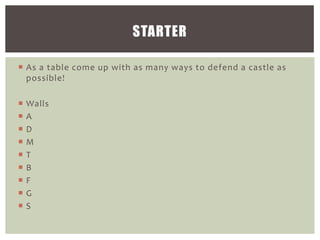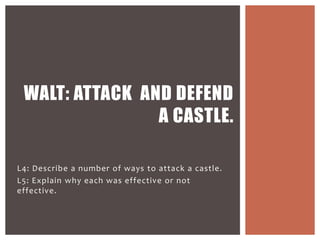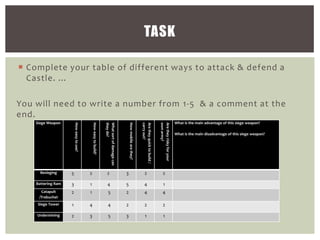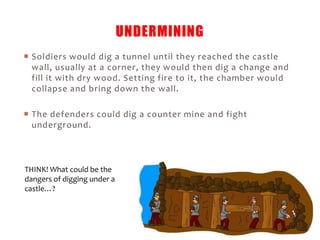703 - Attacking a castle
- 1. STARTER ïĄ As a table come up with as many ways to defend a castle as possible! ïĄ ïĄ ïĄ ïĄ ïĄ ïĄ ïĄ ïĄ ïĄ Walls A D M T B F G S
- 2. WALT: ATTACK AND DEFEND A CASTLE. L4: Describe a number of ways to attack a castle. L5: Explain why each was effective or not effective.
- 5. TASK ïĄ Complete your table of different ways to attack & defend a Castle. âĶ You will need to write a number from 1-5 & a comment at the end. Are they quick to build / carry out? Are they risky for your own army? How mobile are they? What sort of damage can they do? How easy to build? How easy to use? Siege Weapon Besieging 5 2 2 3 2 2 Battering Ram 3 1 4 5 4 1 Catapult /Trebuchet 2 1 5 2 4 4 Siege Tower 1 4 4 2 2 2 Undermining 2 3 5 3 1 1 What is the main advantage of this siege weapon? What is the main disadvantage of this siege weapon?
- 6. BARBICAN ïĄ This was an extra gatehouse at the front of the castle, it was the first place attackers might hit, so it was hard to attack. ïĄ It had a PORTCULLIS â Strong oak or metal gate that ïĄ It had murder holes, that soldiers could poor down onto the heads of the attackers.
- 7. BATTLEMENTS ïĄ Battlements stuck out of the walls so that soldiers could drop heavy stones and pour boiling tar onto the enemy below. ïĄ They also had Arrow Loops to allow archers to fire on the attackers.
- 8. ROUND TOWERS Most castles had round towers in their walls. They had very thick walls to defend and very narrow staircases. This was so soldiers could fire in all directions along the front walls.
- 9. SIEGE TOWER ïĄ These siege towers had a drawbridge at the top. The soldiers would climb up and rush across the drawbridge onto the castle. ïĄ It took a lot of time to get to the top and wheel it into place. They were often wooden.
- 10. BESIEGING ïĄ Castles were very strong, sometimes the only method was to wait. This was called laying siege. ïĄ You basically waited till they ran out of food. THINK! What do the attackers need to have lots of for this to succeed?
- 11. BATTERING RAM ïĄ The attackers would ram a wooden log against the castle wall or door to try and break a hole into the castle. THINK! How easy is this to move if you are being hit with arrows?
- 12. THE TREBUCHET / CATAPULT ïĄ This would rely on a heavy weight to fall and launch a projectile (a rock or sometimes dead bodies) into or over the castle walls. ïĄ It took a long time to reload and was difficult to direct THINK! What makes this more effective?
- 13. UNDERMINING ïĄ Soldiers would dig a tunnel until they reached the castle wall, usually at a corner, they would then dig a change and fill it with dry wood. Setting fire to it, the chamber would collapse and bring down the wall. ïĄ The defenders could dig a counter mine and fight underground. THINK! What could be the dangers of digging under a castleâĶ?













